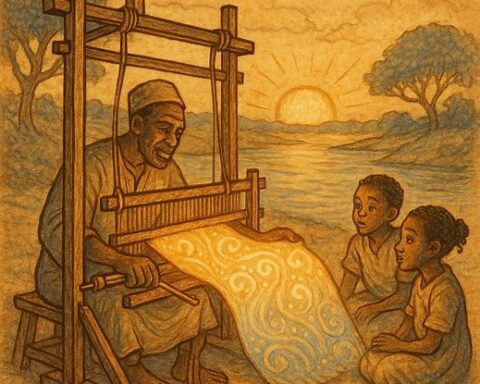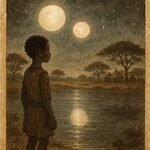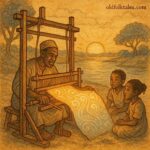There was once a remarkable woman who proved herself a match for any man. Orphaned at six, she grew up in a village where all the children were boys. Instead of being set apart, she joined them in everything, fishing, hunting, climbing, and testing her courage in the ways of men. She was quick, clever, and fearless, and in time, she surpassed them all. Yet her strength and wit, admired in youth, became a burden in adulthood.
When she reached marriageable age, none of the young men dared to ask for her hand. She had bested them in contests, hunts, and feats of skill; their pride could not bear it. Slowly, admiration turned into fear, and fear into resentment. The men avoided her, whispering that she was too vigilant, too clever, too strong. For the woman, this rejection grew unbearable. One day she left the village behind, building a small hut deep in the bush, where she lived alone, sustained by fishing and hunting. She never sought out the company of men again.
In time, she gave birth to a daughter. The girl grew swiftly, learning to swim in the river and climb the tallest trees. Beside their hut stood a towering, leafy tree, and high in its branches the girl would sit, weaving baskets to sell to travellers. She was strikingly beautiful, more so than her mother. Her quiet presence seemed to give life to the tree itself.
One day, while the mother was fishing, a traveller passed beneath the tree. Looking up, he was astonished to see the young woman weaving baskets high among the branches. He marvelled at her beauty and thought, If my chief marries her, all his wives will hide their faces in shame, for none can compare with her. With this, he hurried back to his chief to deliver the news.
The chief listened eagerly. He immediately sent his men to fetch the woman. But when they tried to climb the tree, something strange happened, the trunk grew broader, the branches higher, until the girl was beyond their reach. A sudden wind roared through the branches, hurling the men to the ground. They were killed instantly. One man’s loincloth was torn away and carried on the wind, landing at the chief’s feet. Disappointed but undeterred, the chief sent another party armed with axes to cut the tree down.
READ: When the Chief Was Away: Jealousy and Justice in a Bemba Folktale
Before they could succeed, the girl’s mother appeared from the air. With a single glance, she struck them dead, sparing only one. To him she said, “Do not think I cannot kill you too. I leave you alive only to carry my message: if your chief desires my daughter, let him come himself.”
The survivor fled to the village with trembling legs. Hearing his words, the chief gathered his bravest warriors and marched into the bush. They surrounded the tree, gazing at the maiden above. But before they could act, the mother emerged from her hut. With her evil eyes she froze them in place. Then she produced a needle with a broad eye and a thick, unbreakable thread. One by one she stitched the warriors together until they died.
At last, one man was allowed to climb and speak to the girl. She gave him a basket to carry to the chief as a sign of her regard. Encouraged, the chief came himself the next day. The mother rushed forward, ready to unleash her magic, but the daughter cried out, “Mother! Let him do with me as he wishes. I am of marriageable age.” Reluctantly, the mother relented.
The chief climbed with effort and reached the girl. Overcome with love, he pleaded, “If you marry me, I will do as you wish.”
“Men cheat women,” she replied.
“I will not,” he promised.
“If I ask you to fetch water?”
“I will not. This I promise.”
“If I ask you to hoe?”
“I will not. This I promise.”
“If I ask you to pound maize?”
“I will not. This I promise.”
Satisfied, she agreed: “Then ask my mother and marry me.” Together they descended, and the chief greeted the mother respectfully. They were wed at once. On their return journey, the chief begged his mother-in-law to restore his dead men. With her enchanted gaze and whispered words, she revived them. “Build your homes here and bring your families,” she commanded before vanishing into invisibility.
In the chief’s village, jealousy soon stirred. His other wives, consumed with envy, plotted against the newcomer. They poisoned water and offered it to her. But the mother’s voice spoke from the air: “Do not drink, it is poisoned.” To prove it, she gave the calabash to a dog, which fell dead. Then they poisoned food, but again the warning came. The food was fed to a cow, which also died.
The young wife summoned the chief. Furious, he confronted his wives. Before punishment could fall, they fled into the bush, never to return. Thus, the woman of the tree became the chief’s honoured wife, her mother’s power shielding her from all harm.
Moral Lesson
This Zambian folktale shows that true strength is not only in skill but also in resilience and wisdom. The woman and her daughter faced rejection, envy, and danger, yet through courage, vigilance, and the guidance of ancestral power, they prevailed. The story also warns against jealousy and treachery, teaching that such schemes lead only to ruin.
Knowledge Check
Q1: Why did the men in the village avoid the woman?
A1: They feared her because she was stronger, wiser, and more skilled than all of them.
Q2: What did the daughter do while sitting in the tall tree?
A2: She wove baskets to sell to passersby.
Q3: How did the tree protect the girl when men tried to climb it?
A3: It grew taller and broader, then cast the men down with a fierce wind.
Q4: What task did the mother perform with her enchanted needle?
A4: She stitched the warriors together until they died.
Q5: How did the new wife escape poisoning attempts?
A5: Her mother warned her from the air, and the poisoned food and water were tested on animals, which died.
Q6: What lesson does the tale teach about envy?
A6: Envy and treachery destroy relationships and drive people into isolation and loss.
Folktale Origin Source: Bemba folktale, Zambia. Collected in Folktales of Zambia (see: Chiman L. Vyas, comp., “Folktales of Zambia” collection).







